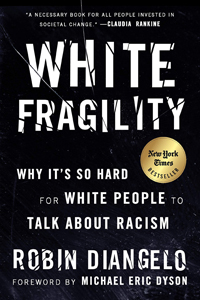 Robin DiAngelo, White Fragility: Why It's So Hard for White People to Talk About Racism (Boston: Beacon Press, 2018), 169pp.
Robin DiAngelo, White Fragility: Why It's So Hard for White People to Talk About Racism (Boston: Beacon Press, 2018), 169pp.
During her twenty years as a diversity training expert, Robin DiAngelo noticed a very consistent and predictable pattern of responses from white people when she tried to discuss racism with them in her workshops — numerous versions of denial and defensiveness that functioned to protect the many benefits of white privilege. In 2011, she coined the term "white fragility" to describe these responses. In 2018, she published her book by this title, which has enjoyed 100 weeks on the NY Times best seller list, including a resurgence in sales after the murder of George Floyd in May of 2020. She specifically addresses her book to "white progressives," precisely because they imagine themselves to be enlightened, and who in her opinion "cause the most daily damage to people of color" (her italics).
White fragility is more than denial and defensiveness. DiAngelo calls it a "sociology of dominance: an outcome of white people's socialization into white supremacy and a means to protect, maintain, and reproduce white supremacy" (her italics). White fragility is "born of superiority and entitlement."
In her view, racism is not so much a "discrete act" that's committed by a single individual, although it would be easy to think of such examples. Rather, it is a complex, interconnected system of unequal institutional powers that functions independently of our individual actions and attitudes. All of us are socialized into these powerful cultural forces of racism: media, schools, segregated neighborhoods, depictions of whiteness as the norm, standard, or ideal by which other races are judged, misleading histories, jokes, stereotypes, etc. The racism that results from our cultural conformity is thus largely implicit, unconscious, and unintentional.
No person is excepted from this racist system. No explanation of any sort "exempts you from the forces of racism." A "racism-free upbringing is impossible." The "the ubiquitous socializing power of white supremacy cannot be avoided." White racism is thus "inevitable." "Nothing exempts me from the forces of racism." To claim otherwise, to deny, deflect and to explain, reflects "a profound lack of self-awareness."
Further, only whites can be racists because only whites enjoy the collective institutional power and privileges — economic, educational, political, social, etc. that are denied to all other people of color. So-called "reverse discrimination" is, therefore, a meaningless phrase. Indeed, "a positive white identity is an impossible goal. White identity is inherently racist," because "white people do not exist outside the system of white supremacy." Whiteness, then, is necessarily and inextricably connected to privilege and power. You can only do what DiAngelo says that she does: "strive to be 'less white.'"
Consciousness raising is a good thing, but it's only a beginning and not a substitute for the heavy lifting of systemic changes. Raising awareness is good, but by itself does not correct institutional injustices. DiAngelo admits that she is more interested in diagnosis than in solutions. Her suggestions for progress are generic and personal, rather than institutional, systemic or policy-oriented.
Other critics have observed how in DiAngelo's framing of the topic, any critical response by whites is construed as proof of their racism. Carlos Lozada observed that "either white people admit their inherent and unending racism and vow to work on their white fragility, in which case DiAngelo was correct in her assessment, or they resist such categorizations or question the interpretation of a particular incident, in which case they are only proving her point." Similarly, Jesse Lile argued that DiAngelo's concept of white fragility "places white people in a double bind, first challenging them to engage in a conversation on racism, then treating any active engagement on their part as an exercise of white privilege, and finally labelling them as fragile when they object to their ideas being dismissed on the basis of their skin color." Still others have argued that the book is condescending to blacks, and that it even infantilizes them (John McWhorter, "The Dehumanizing Condescension of White Fragility" (The Atlantic, July 15, 2020)).
This is an unapologetically polemical book that provokes strong opinions and lots of conversation. That alone makes it worth the read.
Dan Clendenin: dan@journeywithjesus.net


